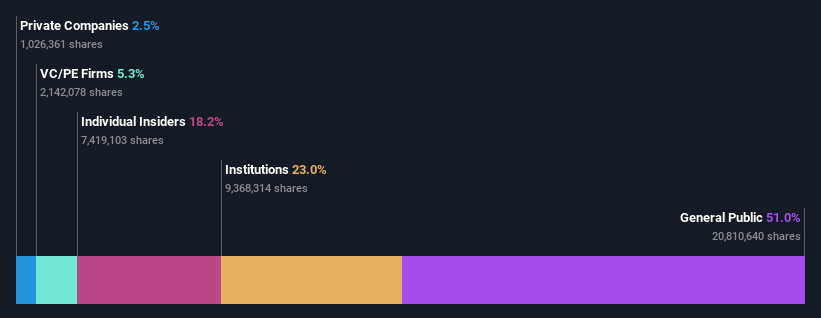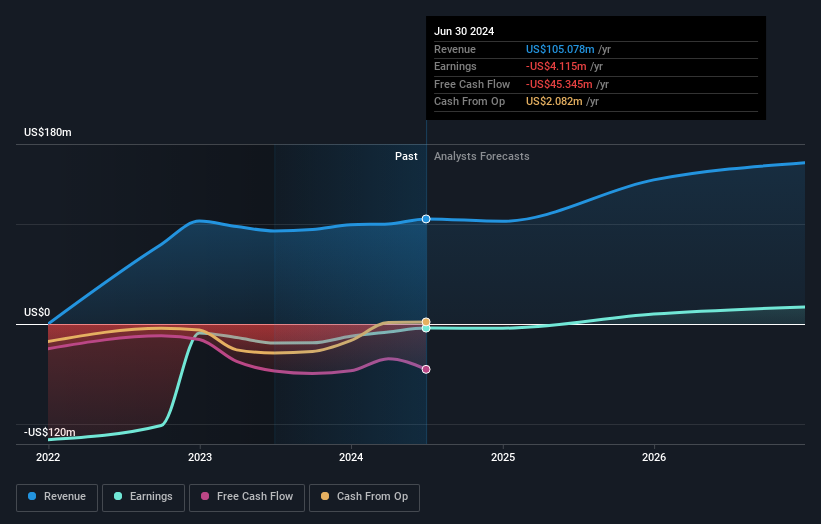- United States
- /
- Chemicals
- /
- NasdaqGM:ARQ
Institutions profited after Arq, Inc.'s (NASDAQ:ARQ) market cap rose US$36m last week but individual investors profited the most

Key Insights
- Arq's significant individual investors ownership suggests that the key decisions are influenced by shareholders from the larger public
- The top 25 shareholders own 45% of the company
- Insiders have been buying lately
Every investor in Arq, Inc. (NASDAQ:ARQ) should be aware of the most powerful shareholder groups. And the group that holds the biggest piece of the pie are individual investors with 51% ownership. That is, the group stands to benefit the most if the stock rises (or lose the most if there is a downturn).
Following a 17% increase in the stock price last week, individual investors profited the most, but institutions who own 23% stock also stood to gain from the increase.
In the chart below, we zoom in on the different ownership groups of Arq.
View our latest analysis for Arq

What Does The Institutional Ownership Tell Us About Arq?
Many institutions measure their performance against an index that approximates the local market. So they usually pay more attention to companies that are included in major indices.
We can see that Arq does have institutional investors; and they hold a good portion of the company's stock. This can indicate that the company has a certain degree of credibility in the investment community. However, it is best to be wary of relying on the supposed validation that comes with institutional investors. They too, get it wrong sometimes. If multiple institutions change their view on a stock at the same time, you could see the share price drop fast. It's therefore worth looking at Arq's earnings history below. Of course, the future is what really matters.

Hedge funds don't have many shares in Arq. Our data shows that Julian McIntyre is the largest shareholder with 7.6% of shares outstanding. In comparison, the second and third largest shareholders hold about 5.5% and 5.3% of the stock. Furthermore, CEO Robert Rasmus is the owner of 2.4% of the company's shares.
On studying our ownership data, we found that 25 of the top shareholders collectively own less than 50% of the share register, implying that no single individual has a majority interest.
While it makes sense to study institutional ownership data for a company, it also makes sense to study analyst sentiments to know which way the wind is blowing. There is some analyst coverage of the stock, but it could still become more well known, with time.
Insider Ownership Of Arq
While the precise definition of an insider can be subjective, almost everyone considers board members to be insiders. The company management answer to the board and the latter should represent the interests of shareholders. Notably, sometimes top-level managers are on the board themselves.
Most consider insider ownership a positive because it can indicate the board is well aligned with other shareholders. However, on some occasions too much power is concentrated within this group.
It seems insiders own a significant proportion of Arq, Inc.. Insiders have a US$45m stake in this US$247m business. This may suggest that the founders still own a lot of shares. You can click here to see if they have been buying or selling.
General Public Ownership
The general public, who are usually individual investors, hold a substantial 51% stake in Arq, suggesting it is a fairly popular stock. This level of ownership gives investors from the wider public some power to sway key policy decisions such as board composition, executive compensation, and the dividend payout ratio.
Private Equity Ownership
With a stake of 5.3%, private equity firms could influence the Arq board. Sometimes we see private equity stick around for the long term, but generally speaking they have a shorter investment horizon and -- as the name suggests -- don't invest in public companies much. After some time they may look to sell and redeploy capital elsewhere.
Next Steps:
While it is well worth considering the different groups that own a company, there are other factors that are even more important. Take risks for example - Arq has 2 warning signs we think you should be aware of.
Ultimately the future is most important. You can access this free report on analyst forecasts for the company.
NB: Figures in this article are calculated using data from the last twelve months, which refer to the 12-month period ending on the last date of the month the financial statement is dated. This may not be consistent with full year annual report figures.
New: Manage All Your Stock Portfolios in One Place
We've created the ultimate portfolio companion for stock investors, and it's free.
• Connect an unlimited number of Portfolios and see your total in one currency
• Be alerted to new Warning Signs or Risks via email or mobile
• Track the Fair Value of your stocks
Have feedback on this article? Concerned about the content? Get in touch with us directly. Alternatively, email editorial-team (at) simplywallst.com.
This article by Simply Wall St is general in nature. We provide commentary based on historical data and analyst forecasts only using an unbiased methodology and our articles are not intended to be financial advice. It does not constitute a recommendation to buy or sell any stock, and does not take account of your objectives, or your financial situation. We aim to bring you long-term focused analysis driven by fundamental data. Note that our analysis may not factor in the latest price-sensitive company announcements or qualitative material. Simply Wall St has no position in any stocks mentioned.
About NasdaqGM:ARQ
Arq
An environmental technology company, engages in the sale of consumable air, water, and soil treatment solutions based on activated carbon in the United States and Canada.
Reasonable growth potential with mediocre balance sheet.
Similar Companies
Market Insights
Community Narratives



